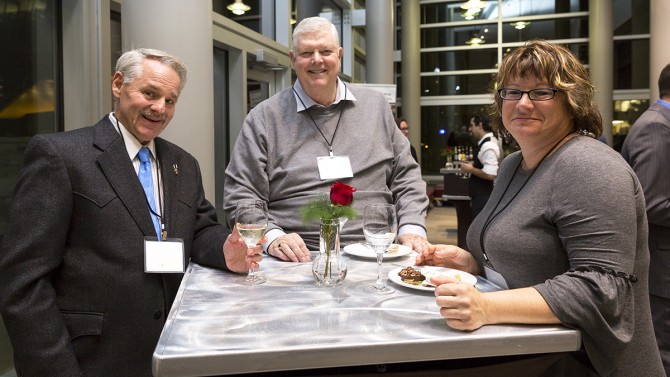Veterans start businesses at entrepreneurship boot camp
By Susan Kelley
Combat veteran Diana Rider served in the U.S. Army for two years of active duty, including 365 days in a war zone in Iraq. Serving in a military police battalion, she was shot at and a Humvee in which she was a passenger was blown up. “I had Saddam Hussein land in a Black Hawk helicopter 200 feet from where I was sitting,” she said.
Through it all, she got her job done with sometimes limited resources. “How do you move 380 detainees across the Iraqi desert when you’ve got only two busses and a Humvee? You figure it out,” she said. “When I was given a task, failure was not an option.”
Vets develop that tenacity, problem-solving and get-it-done attitude through military service. And those characteristics also make them successful entrepreneurs.
Now Rider is one of 15 veterans in residence through Nov. 11 at the 2017 Entrepreneurship Bootcamp for Veterans with Disabilities (EBV) at the School of Hotel Administration. The EBV program provides entrepreneurial training and education geared to veterans with service-related disabilities. The Hotel School is one of 10 colleges and universities that provide this program at no cost to veterans. Cornell’s EBV program is the only one serving veterans who want to develop a hospitality-related business.
“EBV enables military personnel to leverage Cornell’s deep commitment to using education to improve lives,” said Kate Walsh, MPS ’90, the Hotel School’s dean and E.M. Statler Professor. “We are deeply appreciative of the sacrifice these women and men have made serving our country, and we are pleased to have the opportunity to help shape their futures.”
The program starts with a 30-day, online curriculum that aligns the veterans’ business concepts with their markets through a process of customer discovery. At the nine-day residency, students live on campus and each build a business model that aligns with their business concept. Then participants have one year of ongoing support from the Hotel School, Syracuse University’s Institute for Veterans and Military Families and the U.S. Small Business Administration.
The program has prompted entrepreneur Don Stallings to reframe his business concept in terms of how to meet a need, not just offer a product. After 24 years of service in the U.S. Army – including two overseas combat deployments – he is cooking up a business plan for a barbecue food truck and eventually a catering business. “It doesn’t matter what your product is. If people don’t want it or there’s not a need, you’re not going to be successful,” Stallings said. “So, I had to shift and think, if my demographic wants tofu burgers instead of buffalo burgers, then that’s what I’ve got to do.”
About 86 percent of participants start a business within two years of finishing the program, says EBV director Neil Tarallo. And 93 percent of those businesses are still in operation two years after opening their doors, he said. “That’s extraordinary, especially when you think about the failure rate – about 40 to 45 percent – for new businesses in general, and then compound that with food and beverage businesses, which have the highest rate of failure in the United States,” he said. “It’s pretty impressive.”
EBV has taught Connie Baptiste, who served in the U.S. Air Force for 20 years, to focus on achieving one strategic goal at a time. She plans to take her catering operation, Manna from Heaven, in Locust Grove, Georgia, from a hobby to a business, and employ other vets as it grows, she said. “Service doesn’t end when we take off the uniform,” she said.
To be on an Ivy League campus and part of the EBV network will open up doors, she said. “Access to these faculty, there’s no dollar amount you can put on that. The level of education and the prestige that comes with it, it literally changes you, internally and externally. You stand taller.”
The program has prompted Rider to refocus her home bakery business, Lillie Pad Creations, on convenience for the customer, not just custom cakes. “We [participants] have all these grandiose plans, and what we’re learning is we need to start simple and build from that,” she said. “They’re giving us the scaffolding we need to get to where we want to go.”
Media Contact
Get Cornell news delivered right to your inbox.
Subscribe